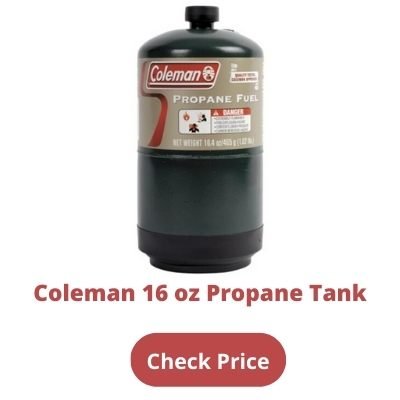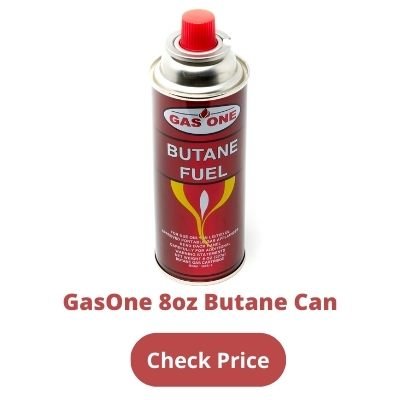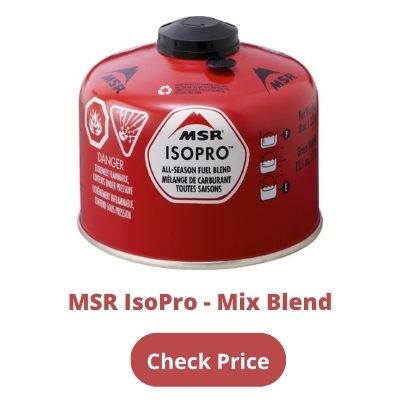The type of fule used with camping stoves has always been a topic of debate among campers. I too have my fair share of experience with different camping fuels & stoves and I can tell you that there is no one-solution-fit-all kind of answer to the question – which fuel is best for camping stove?. In this article, I want to discuss butane vs propane as the most fought over fuel types for camping stoves along with other more sophisticated mix blends.
Butane vs Propane debate is old. As camping fuel, the two major considerations are temperature sensitivity & carry weight. Propane is a better fuel for cold weather due to its lower boiling point (-42 F) while Butane doesn’t work below 32 F. On the other hand, Steel Propane tanks are heavier to carry compared to lightweight Butane canisters.
Let’s look at things in more detail and compare Butane & Propane on different parameters and see which one makes a better fuel for camping stoves.
Qualities of a better camping fuel
Selecting a suitable camping fuel is quite different from selecting fuel for your backyard BBQ party. For your BBQ party, you don’t have to worry about many of the factors like carrying weight, temperature sensitivity, Refuelability, etc while all these factors play an important role during your camping trip.
For our comparison today, we will be looking at the following qualities in both these popular fuel types and see which one comes out as a better fuel for our camping stoves.
- Temperature tolerance: A good camping fuel should be 4-season i-e should work in all temperatures specially in cold.
- Weight: Should be lightweight to carry in your backpack.
- Cost: Should be low cost to reduce your overall camping expenses.
- Energy density: It should have a higher energy density to give you more cooking/boiling time per pound of fuel.
- Availability: You should be able to find it in any hardware store nearby or at gas stations. You can’t order fuels online due to shipping restrictions so this is important factor.
- Refilling capability: The cylinder should be refilliable to reduce waste and cost of buying new cylinder everytime.
- Compatibility: A fuel can or tank should be compatible with most camping equipments (lanterns, stoves, grills etc.)
- Vapour Pressure: A high vapour pressure means the fuel will require more sturdy container but will continue to work at lower temperatures.
Let’s compare the two fuels – Propane & Butane and see how they far along on these points.
Temperature Tolerance
If you are comparing fuels for home usage, this might not be the most important factor to look at but if you are out in the wild, you have to make sure you have fuel that works in all expected temperature ranges. Imagine camping in sub-zero temperature only to find out your fuel is the wrong type and won’t burn at that temperature. bummer right?
Gaseous fuels like Propane & Butane only work at a temperature above their flash point (the boiling point where liquid converts to gas). Below the flashpoint, the fuel condenses down to liquid form and won’t pass through your stove to burn.
PROPANE: Propane has a boiling point of -43.6°F (-42°C). That means, above that temperature, your Propane tank will have gaseous Propane to fuel your stove and other equipment. Now it’s very rare for people to camp below that temperature. This makes Propane one of the ideal fuels for all-season camping. You can say Propane is the perfect 4-season camping fuel.
BUTANE: Butane has a flashpoint of 30.2°F (-1°C). That means, if you are camping below that temperature (which is pretty common in winters and on high altitudes) your butane canister will not work because all the gaseous butane will convert to liquid inside the canister and you won’t have any gas to burn your stove. So, butane is only good for warm weather camping.
CONCLUSION: Propane works for all seasons including winter camping. Butane works only for warm-weather camping.
Carry Weight
Weight is an important consideration when it comes to any camping equipment. Especially if you are backpacking, you would want your camping fuel cylinder & associated equipment (connectors, stove, etc) to be extremely lightweight.
PROPANE: Propane has a very low boiling point as we discussed above. That’s why, to store Propane, you have to compress it to a high pressure to convert it to a liquid state. This high pressure requires a sturdy cylinder construction made of thick stainless steel. This makes Propane cylinders quite heavy.
BUTANE: On the other hand, butane does not require very high pressure to store and can be stored in thin aluminum canisters (much like body spray cans). These canisters are quite lightweight and portable.

For a better comparison, let’s calculate the weight of the canister/cylinder per unit weight of fuel. A standard 16oz (1lb) Coleman propane tank weighs around 1lb (this is called empty or tare weight) and it holds 1lb of Propane. In comparison, a Coleman 8 oz canister has a tare weight of 0.3125 lb.
Doing some back-of-the-napkin math reveals that the Butane canister is 40% lighter than Propane for holding the same amount of gas.
CONCLUSION: Propane cylinders are heavy compared to Butane for storing the same amount of fuel.
Cost of fuel
Cost is another important factor when deciding between Butane and Propane. Although retail market prices vary from brand to brand and from location to location, we can get a pretty good idea of the price difference by looking at open market spot prices for the fuel.
The data published by U.S Energy Information Administration shows that from October-2019 to October 2020, Butane has been $0.5 more expensive than Propane on average. The below table shows the cost difference between the two fuels at Henry Hub for 12 months.
| Month | Butane Price ($/BTU) | Propane Price ($/BTU) | Difference ($) |
|---|---|---|---|
| Nov 2019 | 6.9965 | 5.8753 | 1.1212 |
| Dec 2019 | 6.6684 | 5.4421 | 1.2263 |
| Jan 2020 | 6.97 | 4.3988 | 2.5712 |
| Feb 2020 | 6.1872 | 4.3192 | 1.868 |
| Mar 2020 | 3.3546 | 3.5146 | -0.16 |
| Apr 2020 | 3.3432 | 3.5545 | -0.2113 |
| May 2020 | 4.0856 | 4.5168 | -0.4312 |
| Jun 2020 | 5.1402 | 5.3929 | -0.2527 |
| Jul 2020 | 5.0875 | 5.4109 | -0.3234 |
| Aug 2020 | 5.4595 | 5.6686 | -0.2091 |
| Sep 2020 | 6.1084 | 5.3998 | 0.7086 |
| Oct 2020 | 6.1489 | 5.7136 | 0.4353 |
| AVERAGE | 5.49 | 4.93 | 0.528 |
But the cost of fuel in the open market does not tell the whole story. Half of the price comes from the canister used to store the gas. That’s why it is also important to consider the retail cost of available gas in your local market.
Let’s see the per-gallon cost of Propane & Butane at Walmart for reference. Other outlets may have different prices but this will give us a general idea to make a conclusion about Butane vs Propane cost. For a more accurate assessment, we will look at Propane & Butane fuels from the same brand – Coleman.

| Fuel type | Weight (oz) | Cost ($) | Per unit cost ($/oz) |
|---|---|---|---|
| Coleman Propane 16 oz tank | 16 | 3.97 | 0.248 |
| Coleman Butane 8oz Canister | 08 | 2.97 | 0.37 |
CONCLUSION: On average, Butane is around 40% more expensive than Propane when retail prices are compared.
Energy Density
The discussion of cost is incomplete without discussing the energy density of each fuel. What if the per-unit weight cost of one fuel is double compared to the other but it also boils double the amount of water compared to the expensive fuel? So, solely looking at per unit weight cost of fuel can be misleading sometimes.
Energy density is the amount of BTUs stored per unit weight of the fuel whereas BTU is the unit of energy.
In my personal experience, a 16oz Propane tank lasts for 2 hours on a high flame 2 burner stove. Interestingly, an 8oz Butane canister will also last somewhere around 1.5 to 2 hours on a 2 burner stove. What does that prove? Butane has a higher energy density (8oz of Butane can run as long as 16 oz Propane).
This difference in energy density explains why Butane is overall a more expensive fuel.
Refilling Capability
If you can refill a cylinder again and again from a bigger tank, you will save a lot on the cost of buying a new cylinder and will just pay for the gas in bulk. For someone who does camping a lot, this is an important factor to consider.
PROPANE: Propane cylinders are made from thicker and more sturdy stainless steel which makes them suitable for multiple usages. Once empty, you can refill it from a larger 20lb Propane tank at home or from your nearest hardware depot. I have written a post about refilling a 1lb propane tank if you want to read it.
To refill a smaller Propane tank from a larger one, all you need is a cheap refill adaptor that you can find on Amazon or any hardware store. Do note that not all cylinder types are recommended for a refill. Make sure you read and understand the manufacturer’s guidelines before doing a refill job. Also, some states do not allow refilled cylinders to cross into their state line so that’s also important to take into consideration.
BUTANE: On the other hand, pure Butane that comes in small 4oz and 8oz canisters are disposable and cannot be refilled (nor I would advise any such attempt). As Butane is an expensive fuel to start with, its inability to be refilled makes it even more expensive as every time you buy the gas, you pay for the disposable can as well. This makes it expensive and not very environmentally friendly.
Important note: Some cylinders come with a mixture blend of Butane/Propane (will discuss the benefits at the end of this post). The blend is normally 80/20 Butane/Propane. These cylinders can also be refilled but with caution. NEVER refill them with 100% Propane else you will risk an explosion due to the high vapor pressure of pure Propane. They are not designed to hold that much pressure.
CONCLUSION: 16oz Propane tanks can be refilled from a larger tank. 4oz and 8oz Butane canisters cannot be refilled.
Availability
Availability is another important factor. You don’t want to be stuck with a stove that runs on a fuel or cylinder type that is only available at specific locations. You need something universal that you can find anywhere in the city or along your road to the campsite.
Both Butane and Propane cylinders are commonly available across the US in almost all hardware, sports, or retail stores. If I have to make a comparison, I would say Propane cylinders are more common in hardware stores and retails compared to Butane.
The reason for the high availability of Propane is its universal use. Propane cylinders are compatible with most of the camping equipment which makes it a profitable product for retailers to put on shelves. On the other hand, Butane canisters can only be used with stove types that support them.
CONCLUSION: Both fuel types are readily available. For sake of comparison, Propane is more widely sold across all retail networks.
Equipment Compatibility
Propane cylinders and Butane canisters have different connectors so you can’t use them with equipment interchangeably (without using additional converters).
Propane cylinders come with screw-type connectors due to their high vapor pressure. These cylinders are connected to the stove either directly or via a hose.
Butane stoves have built-in space to insert canisters. The butane canisters come with plug-in type connectors usually called Lindal valves (used with low-pressure cylinders).
However, you can use any good Lindal Valve converter to use a Butane canister with your screw-type Propane stove. Some stoves (like this one from GasOne) are branded as “dual fuel” that comes with a hose to use either a Butane canister or a Propane tank.
CONCLUSION: Both Propane & Butane have their own camping stoves and equipment but can be used interchangeably via a suitable connector or adaptor.
The below table summarises our discussion above comparing both fuels against some important factors.
| Factor | Propane | Butane |
|---|---|---|
| Temperature | Works in cold | Don’t work below 32 F |
| Weight | Heavy cylinders | Lightweight canisters |
| Cost | Comparatively cheaper | 40 % more expensive |
| Energy Density | Low energy density | High energy density |
| Availability | High | Low |
| Compatibility | With most equipment | with specific equipment |
Which fuel type to select – Butane or Propane
We looked at both fuels from different perspectives to get a better understanding of each and see which one fits our needs better. Apart from the other factors, I look at two important factors when selecting any of the fuel types;
- Weight: If I am going on backpacking trip, I take the lightweight and disposible Butane canisters.
- Temperature: If I am going for cold camping, I always take Propane cylinder even if it is heavy because Butane just doesn’t work in cold.
Look at these two factors first and see if any of them are the deal-breaker. If you don’t care much about the weight and are not cold camping, either fuel will work so you have to then go a little deeper and look at other factors like cost, availability, and reusability of the cylinders to see which one suits you best. Also, look at your need If you are going full home kitchen mode during camping or just boiling some hot water for coffee and preparing just add-water meals over a small stove.
BUT if you are still looking for a single-line answer, GO WITH PROPANE and you will never face any difficulty.
What are blended fuels?
In all the heated debate of Butane vs propane, people often forget that there are blended mix fuels that combine the best of both worlds. These blended mixtures are made from Butane, Isobutane (an isomer of butane), and Propane and often come in stainless steel tanks like the ones used for storing pure Propane.
They are marketed as 4-season fuel because they work in all temperatures (the lowest temperature is often marked on the cylinder) and are lightweight compared to pure Propane cylinders.
If you are not going to camp in freezing cold below -42 F, you can get one of these blended fuels and will be good to go. Since they come in cylinders instead of aerosol cans, some of them are refillable although confirm with the specific manufacture before you attempt to refill the tank. Again remember, NEVER refill one of these blended fuel tanks with 100% high-pressure Propane.
Best camping fuel brands
Once you decide to buy a specific fuel type and compatible stove and other equipment, the next thing is to select the brand to buy from. From my own personal experience, the below 3 are one of the best in the camping and outdoors industry.
Recommended Camping Gears: I have compiled a list of my favourite camping gear in one place. The selection is based on my own personal experience using them for many years camping as well as feedback from fellow campers. Check them out on my Recommended Camping Gears page


